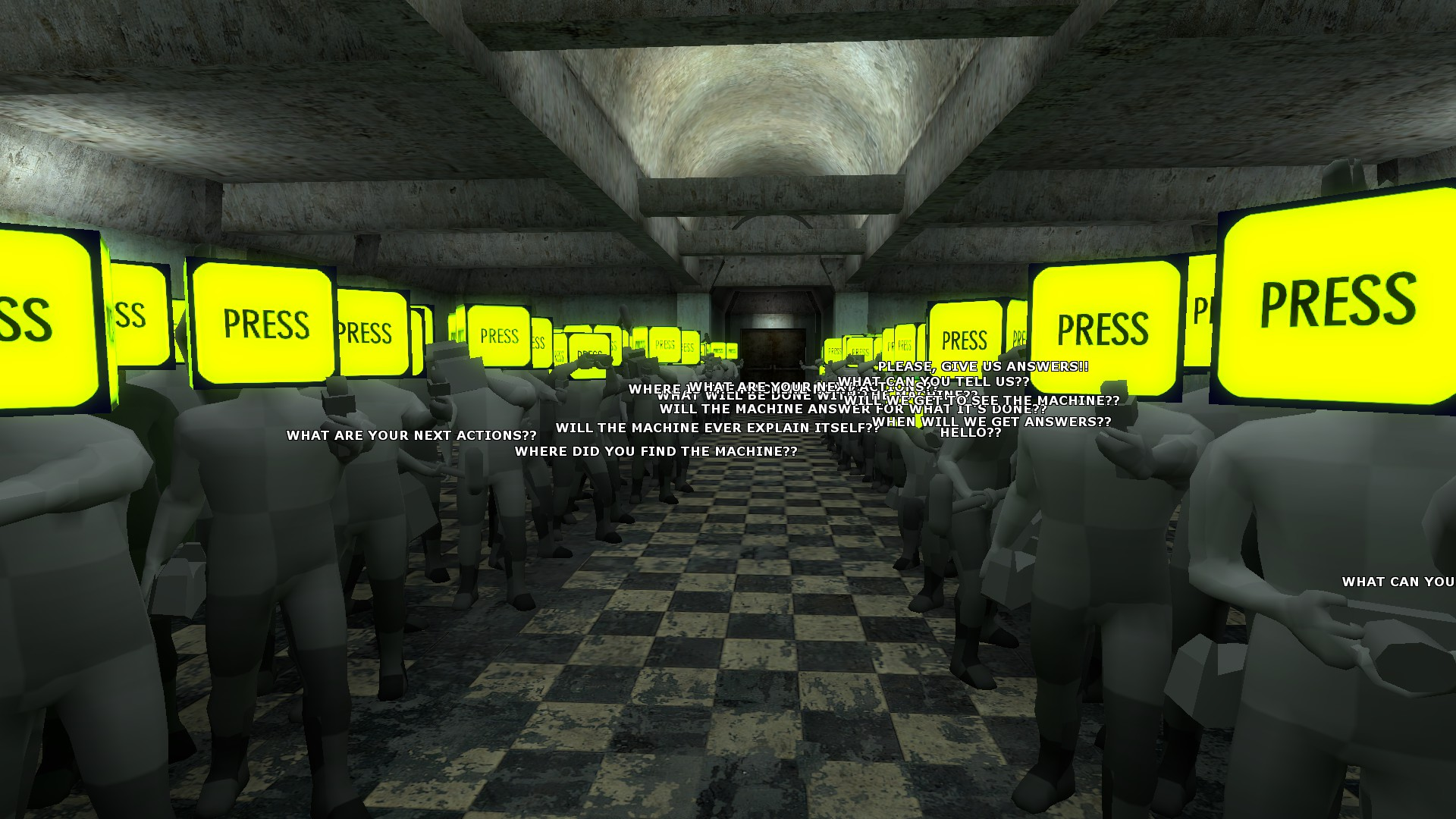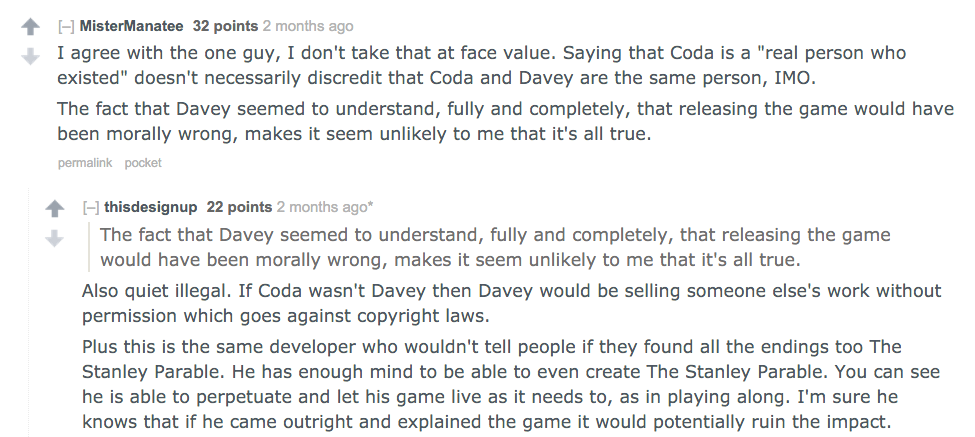Games are usually straightforward. What you think happened is what actually happened — game over, move on. The Beginner’s Guide is different, a story cloaked in ambiguity and mystery. It’s lead some people, albeit a small group, to theorise the game literally represents a criminal act: stolen property. It’s a grave accusation, one that lives on because its designer remains silent.
Over the weekend, parts of the Internet spent hours verbally wringing hands over a comment made in a Destructoid piece by author Laura Kate Dale. In celebrating the year’s “best new IPs” (aka the best games that weren’t sequels), she highlighted The Beginner’s Guide with a caveat:
“Just make sure to complete it within your Steam refund window, as there are legitimate reasons to want to return this game after purchase.”
This set off a firestorm of discussion about the ethical and moral implications of a professional critic recommending players seek refunds for a seemingly good game. It’s an interesting conversation in and of itself — is it wrong for a critic to remind people of their rights? — but most looked past Dale’s reasons for hedging in the first place: “There are legitimate reasons to want to return this game.”
Just prior, Dale lavished The Beginner’s Guide with praise, but said “it’s still unclear how genuine the narrative told is, or how much we can rely on the narrator of the experience”.
It’s understandable to advise people to get a refund if a game is broken. That’s not what was happening here. We’re not talking about a video game with egregious technical problems, like the PC version of Batman: Arkham Knight, this year’s prime candidate for the relevance of a consumer-friendly refund system. Dale’s issues lie with the notion that The Beginner’s Guide might be non-fiction, that it might not be something people would feel good about having paid for.
Crucially, Dale doesn’t explain why that is. Tapdancing around spoilers gets her into trouble, but spelling out the story (which lasts about an hour) would also be dangerous! To understand what’s really happening here, though, you need to know what happens in The Beginner’s Guide.
So, it’s spoiler time.
Narrated by The Stanley Parable co-creator Davey Wreden, The Beginner’s Guide has players experiencing an increasingly upsetting story about Wreden’s toxic relationship with another developer, Coda, by walking through Coda’s design experiments. It begins as an upbeat commentary before it swerves in another direction. The Beginner’s Guide was authored by Wreden, not Coda. Wreden never says who Coda is or if it’s based on someone, but Wreden is a real person — I’ve met him and interviewed him several times. By making himself the narrator, he personalises The Beginner’s Guide in a powerful way. You’re lead to believe what he’s saying in the game might be true.
In the game, it’s clear Coda did not consent to Wreden showing off their work, and Coda is no longer speaking to Wreden. Wreden closely analyses Coda’s work for clues about their mental state, believing Coda’s creations suggest a depressed, creatively unhappy person who needs help. As it turns out, Wreden’s incessant need to share the “brilliance” of Coda’s work with others drives Coda away. The finale has Wreden breaking down, admitting he’s the one at fault, and arguing The Beginner’s Guide is an apology. (Creepy way to apologise, BTW.)
The game ends with a dedication to “R”. It’s unclear who R is.
If that was all true, it’s understandable why Dale would want to give readers a heads up. In that world, Wreden has committed a crime.
In Dale’s mind, she was doing her readers a service. One, recommending The Beginner’s Guide because she enjoyed it. Two, pointing out how a certain reading of the game could make some people feel uncomfortable about having paid money for it, and reminding them of a way out. Third, she refused to divulge the story beats to avoid spoiling anyone who might later play it.
On their own, each is a defensible action by a responsible games writer. Together, it was a powder keg waiting to go off. When it did, the only question that mattered was whether The Beginner’s Guide was work of fiction or not. Despite the ongoing fallout, Wreden won’t say.
Wreden told me he wouldn’t comment on the game’s story or theories about it.
“The only thing I’ll say on the record is that I have no problem at all with anything that Laura wrote in her article,” he said, “and that I think any harassment or abuse directed at her is totally unwarranted and is certainly not condoned by me for any reason.”

Dale later posted a clarification on Destructoid, explaining she viewed The Beginner’s Guide as “a work of fiction”, but “many players view the narrative as an accurate work of non-fiction”. From what I can tell, the non-fiction category is a minority…but it definitely exists.
She cited a fear of spoiling the game as her reason for a more thorough explanation, but still defended the line about requesting a Steam refund:
If you fall into the camp that view this as non fiction, an aspect of the narrative implies that the content is stolen wholesale from another developer. While I paid for the game and believe doing so is a morally acceptable action, what I wish to make clear is that if players disagree with my reading of the narrative and feel I reccomended [sic] them an experience they didn’t morally agree with, there is a financial way to back out of that purchase.
This is not an encouragement to back out of payment due to length, but simply me pointing out that if you finish the game and believe the narrative to be non fiction, and if you believe that you purchased stolen goods, there is a way to avoid your money remaining with that developer in this very specific case.
Dale cited an off the record conversation with Wreden that made her feel “a lot more confident”. When asked about it, she declined to elaborate. So did Wreden.
The Beginner’s Guide disturbed me. It felt invasive — predatory, even. The mere possibility that Wreden had repurposed Coda’s work for his own, selfish purposes was uncomfortable to consider. Just because my personal interactions with Wreden were cordial doesn’t mean Wreden is a good person, so I, too, considered it could all be true. But this tortured feeling, planted as a voice in the back of my head as I played, felt deliberate. The Beginner’s Guide is effective because it relies on the narrative trick deployed by films like The Blair Witch Project, which traded scares on the tiny chance that it might be true.
I wasn’t alone in feeling this way, either. Here’s Giant Bomb‘s Austin Walker in his review:
The Beginner’s Guide feels autobiographical, but I can’t quite place how autobiographical it is (if at all). It’s hard to know where the Wreden the (real life) designer, Wreden the (in-game) narrator, and Coda end and begin. Though I was fairly confident throughout my playthrough that the Wreden (the designer) invented Coda and built all of his games for the purposes of The Beginner’s Guide, when I reached the end credits I found myself with the sinking feeling that I’d wandered into a private conflict that I had no right to see. Without being too direct, let me say that if I knew that the most potent and personal story elements of The Beginner’s Guide were true, I don’t think I would have written about it all.
Others, like Cobra Club designer Robert Yang, wondered if Coda was based on themselves, given Yang was in the same circles during the periods of time outlined in The Beginner’s Guide.
The confusion over the game’s basis in reality was debated by critics and players alike. The game’s subreddit has filled up with various interpretations on how to view Wreden and Coda’s relationship.

Most people — including this author — presumed The Beginner’s Guide was fiction because it seemed wildly implausible a successful developer would commit a blatantly illegal act for everyone — friends, fans, colleagues — to see. But there’s no denying some were left wondering “yeah, but what if?”

Other players were emotionally distraught when they “realised” it was fiction.

Brutal.
The theory I’ve subscribed to — the one that lets me sleep at night — is that Wreden and Coda are the same person, representing parts aspects of Wreden’s personality. The narrator is the excited and bouncy developer who gives fascinating talks at the Game Developers Conference, craving and actively seeking outward validation. Coda is the existentially distraught developer who wrote and drew a lengthy comic about the anxieties of success and how it made them feel depressed.
Everything I’ve read about The Beginner’s Guide suggests it’s fiction. All of my reporting points in that direction, too. But when presented with the opportunity to take a stand, Wreden refused. As a reporter, I cannot definitively say one way or the other. I can only tell you what I believe.
It’s possible Wreden is enjoying this. In a way, it’s a testament to his art. The Stanley Parable was a clever, subversive work that left players scratching their heads. The Beginner’s Guide, while tonally more serious, accomplished the same goal. And so far, no one’s been arrested.

Comments
10 responses to “The Controversy Over A Video Game’s Suggestion Of A Crime”
this was an extremely confusing way of saying “someone may have released something which is not their own work”
Exactly! What a convoluted explanation..
Well, Kotaku could sue him for real. Get a big scoop and the truth would have to come out.
Coda is clearly fictional. The story set out in the game is too thematically neat and on-point for it to be a real organic conflict between two people. The narrator shows far too much awareness for his supposed obliviousness towards his friends feeling. It is very, very, almost painfully clearly, a work of fiction.
Yeah I’m actually surprised anybody thought it was non-fiction after completing the game.
I feel like her response to her own criticism is more reflective of the intention she meant in the review. It really doesn’t read like that when it was initially published, leaving the hook dangling at the end kind of implies she believed it to be a genuinely serious issue to be considered above all else.
I’m not sure about the issue, myself. I went through The Beginner’s Guide and felt it was a documentary of sorts. I understand potentially no permission (if it’s true/isn’t) was given for the use of certain assets but these existing assets were constructed and used in ways they weren’t intended, through a lens, perspective and structure wholly created from scratch. It also created an genuinely insightful and celebratory look at the craftsmanship and meaning of game design i hadn’t experienced before. Perhaps better wording and positioning of the argument or even just reconsidering the insertion of an awkward and dubious moral argument into every little thing when it bares no relation to the experince itself. Or does it? If we take it as pure fiction then doesn’t this just reflect on our discourse and how vigilant we’ve become to “morality”. I mean, we even have this guy basically state that if the game were complete truth, then Wreden would be a bad person – a curious leap in logic and arbitrary judgement if I ever saw one and one that eschews a holistic, critical perspective for moral narcissism.
It didn’t happen here but it’s curious to me how much people may believe their moral perspective of the creator or the creation of the game to be relevent to a scored review of the content, especially with the content entirely redefined or potentially misunderstood. Maybe people are too enamoured with taking a side or having a clear stance, like there’s no value in ambiguity because it means more discussion. Maybe this is what he’s getting at.
Very curious at those who would be enraged that it were fiction, as well. It almost seems like an emotional response that is wholly regressive to the type of experience the game is. Gamers are not the most literate bunch and we all think we’re right arbitrarily without sufficiently understanding what we’re on about. I feel like there’s so much going on here that any reactionary stance would mean you missed the point. Half of the “gameplay” is almost discourse or consideration and we’re basically supporting the idea that these aren’t worthwhile skills or can’t exist in a game as mechanics by being reactionary. If this is how we react to this, then what other worthwhile creative challenges could we possibly endure or enjoy?
So you should obviously get it, what other game spurs this kind of discussion?
“People might want a refund” “game lasts an hour”.
Or its a clever marketing stunt to get more people to buy with their fingers over the refund button.
What a bitch, suggests refunding a game after completion while still attempting to maintain her appearance of moral values. She is clearly a self-righteous, opiniated and deluded author, the type i avoid like the plague.
I find all of the stories, supposed controversy and rumors about the Beginner’s Guide more interesting than the actual game.
Maybe the discussion about the game is part of the game?
I have finished playing now haven’t I?
Existenz!!